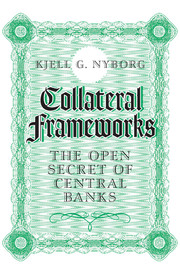Book contents
- Frontmatter
- Contents
- List of Figures
- List of Tables
- List of Exhibits
- List of Examples
- Preface
- Acknowledgments
- 1 Background and Motivation
- 2 Collateral Frameworks: Overview
- 3 Monetary Policy Implementation in the Euro Area over Time
- 4 Evidence on the Production and Usage of Collateral
- 5 Haircuts
- 6 Ratings and Guarantees
- 7 Market and Theoretical Prices
- 8 Collateral “Own Use”
- 9 Non-regulated Markets, Unsecured Bank Debt, and LTRO Uptake
- 10 Market Discipline
- 11 Bailing Out the Euro
- 12 The Endgame of the Euro Crisis
- 13 Restoring Credibility
- 14 The Problem with Collateral
- 15 Concluding Remarks
- Appendix: Haircut and Rating Rules Updates
- References
- Index
10 - Market Discipline
Published online by Cambridge University Press: 06 January 2017
- Frontmatter
- Contents
- List of Figures
- List of Tables
- List of Exhibits
- List of Examples
- Preface
- Acknowledgments
- 1 Background and Motivation
- 2 Collateral Frameworks: Overview
- 3 Monetary Policy Implementation in the Euro Area over Time
- 4 Evidence on the Production and Usage of Collateral
- 5 Haircuts
- 6 Ratings and Guarantees
- 7 Market and Theoretical Prices
- 8 Collateral “Own Use”
- 9 Non-regulated Markets, Unsecured Bank Debt, and LTRO Uptake
- 10 Market Discipline
- 11 Bailing Out the Euro
- 12 The Endgame of the Euro Crisis
- 13 Restoring Credibility
- 14 The Problem with Collateral
- 15 Concluding Remarks
- Appendix: Haircut and Rating Rules Updates
- References
- Index
Summary
Market forces and discipline are important notions in the context of collateral frameworks for several reasons. As illustrated by Equation (2.1) and Figure 2.1, collateral values are determined by applying haircuts to, in principle, market prices. Furthermore, market discipline is typically viewed as an important complement to financial regulation. It is one of the three pillars in both the Basel II and III bank regulation frameworks (BCBS 2011). The idea is that banks, like other enterprises, should be regulated not only through formal regulatory rules, but through the competitive forces of the market. More generally, market and competitive forces are central to the efficient allocation of capital and resources. We would expect this principle to be relevant also in the case of the market for liquidity and the money creation process.
An issue raised in this book, however, is that markets are utilized to a relatively small degree by the Eurosystem's collateral framework. Indeed, it appears that many features of the framework are designed to circumvent market discipline. Chapters 5 to 9 offer much by way of detail that speaks to this. The current chapter distills these findings and discusses some of the consequences of the relative lack of market discipline allowed for by the Eurosystem's collateral framework.
MARKET DISCIPLINE IMPAIRMENT
Several features of the Eurosystem's collateral framework impinge on market discipline. Some of the most noteworthy of these are listed below.
First, non-marketable assets are included in the set of eligible collateral. Thus, banks can obtain liquidity without having themselves or their assets assessed in the market. The evidence shows that the usage of non-marketable collateral has increased in the euro area over time, reaching approximately 10 percent in 2007 and more than 20 percent in 2011 where it has remained (Figure 4.1).
Second, a substantial fraction of marketable collateral on the public list of eligible collateral trades on non-regulated markets (more than 30 percent, Table 9.1). One might expect prices in such markets to be fairly unreliable as compared with regulated markets. This view is supported by the evidence in Table 7.1 that the incidence of theoretical prices is much higher for collateral trading on non-regulated markets than for other marketable collateral.
Information
- Type
- Chapter
- Information
- Collateral FrameworksThe Open Secret of Central Banks, pp. 178 - 191Publisher: Cambridge University PressPrint publication year: 2016
